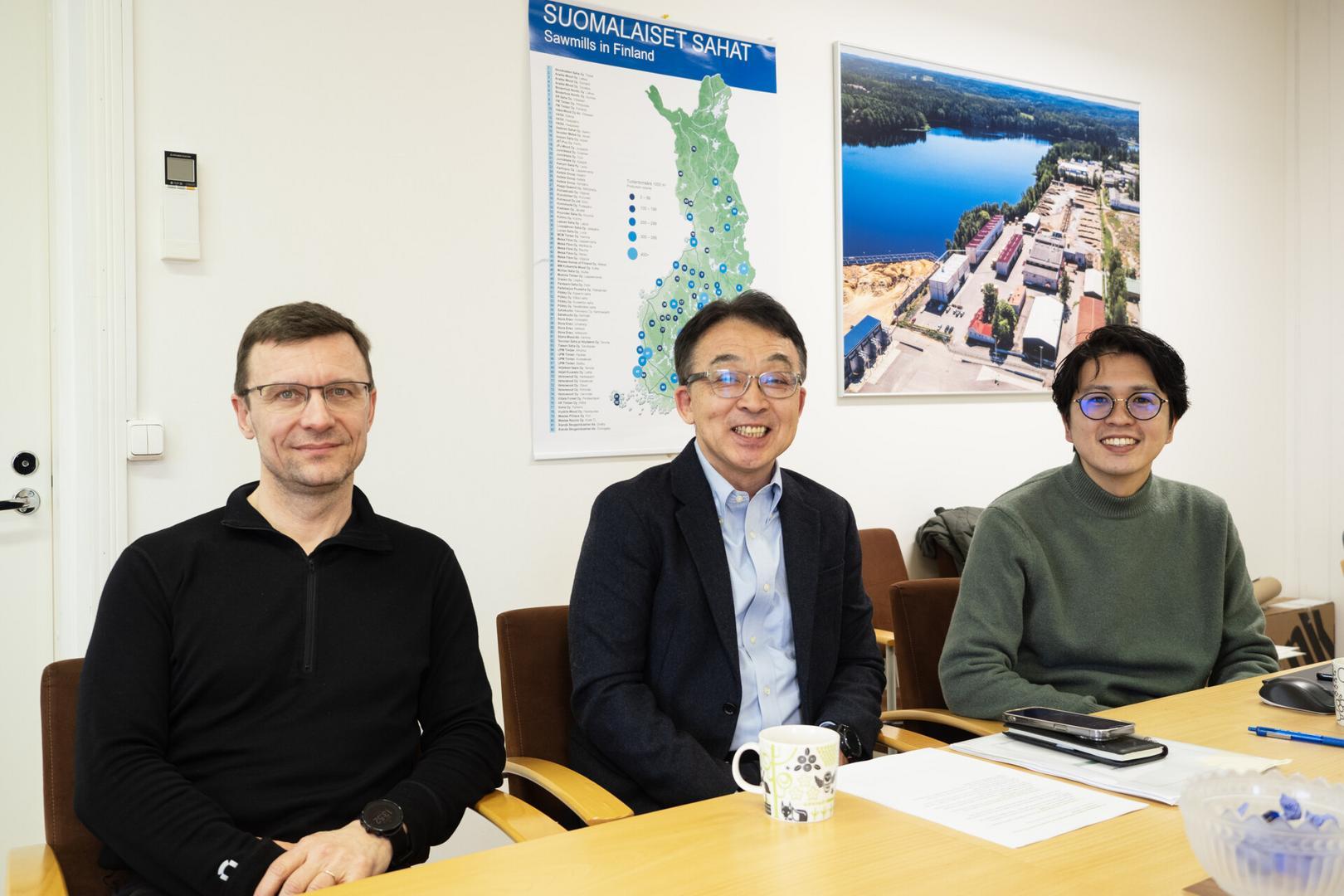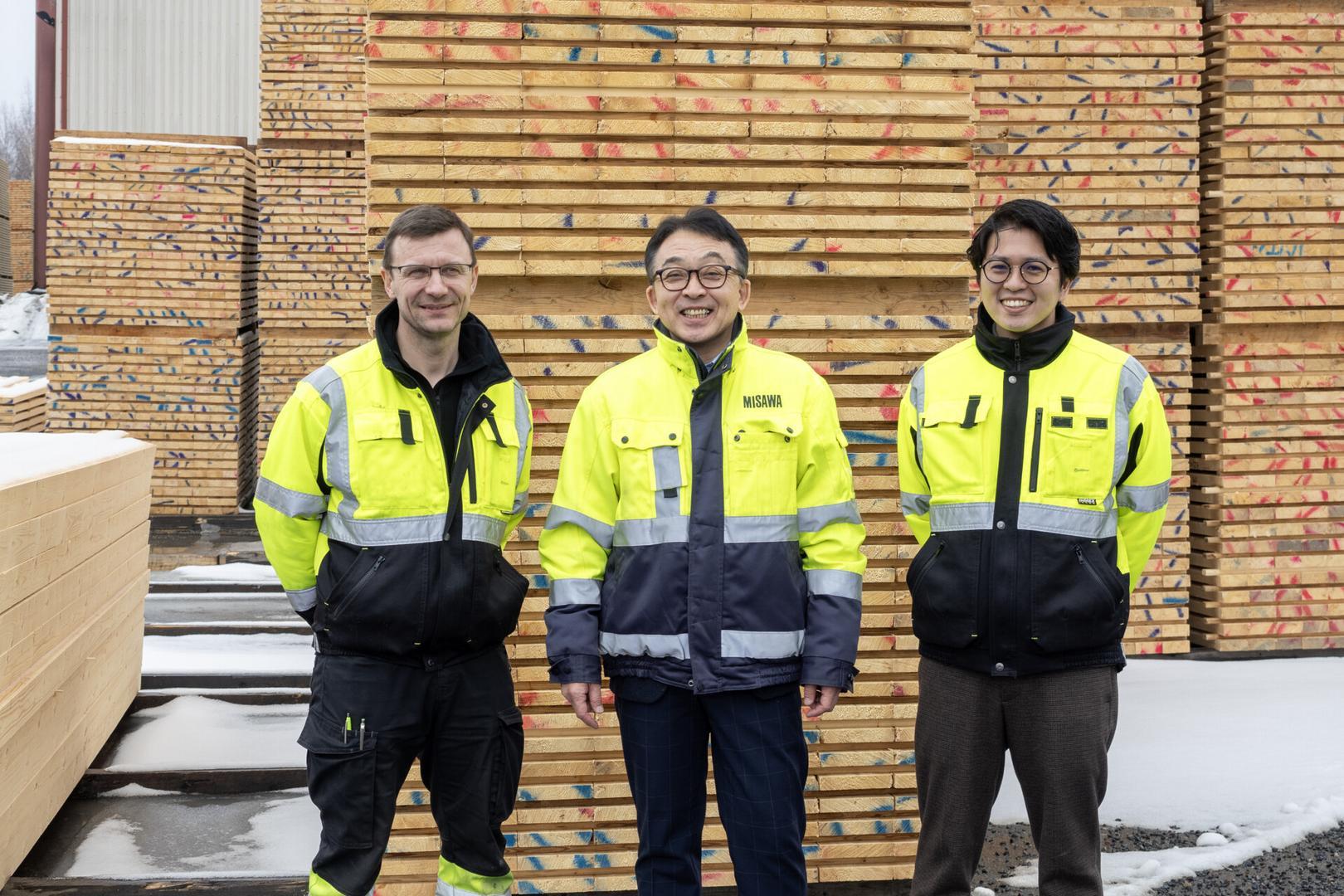Misawa Homes of Finland’s sawmill has been operating in Mikkeli since 1994. Key factors in choosing Mikkeli included efficient energy supply for the sawmill, high-quality natural resources, and active support from the city leadership.
The Misawa Homes of Finland sawmill in Pursiala, Mikkeli, is a unique company both locally and nationally.
The sawmill produces timber from Finnish spruce. The entire production, mainly special-sized planks, is exported to Japan for further processing into glued laminated timber, primarily used in the construction of small houses by Misawa Homes.
Founded in 1994, the Misawa sawmill was one of the first Japanese companies in Finland.
According to CEO Hitoshi Hayashi, the company decided to establish a sawmill in Finland, because it could not obtain the quality it needed from suppliers in North America and Canada.
– We previously operated in the United States and Canada, but at that time the markets were unstable, and the price of timber was rising. We explored different regions for potential operations. In Finland, market risk was lower, and high-quality, consistent timber was available, says Hayashi.
In addition to high-quality wood, the efficiency of the logging chain and expertise in wood processing in Finland also supported the decision.
Factory manager Pasi Lähdelahti recalls that an important factor in Misawa’s establishment in Mikkeli in the 1990s was the active engagement of then-city manager Jyrki Myllyvirta and deputy city manager Eero Kaitainen.
– Mikkeli city people were active in finding a good location for the sawmill, says Lähdelahti.
They found a suitable location in Pursiala, where an old sawmill had previously operated, and the necessary infrastructure, including rail access, was already in place.
Energy from a nearby plant, wood mass for energy and location key factors why choose Mikkeli
One of the most important reasons was the collaboration with Etelä-Savon Energia (Ese), which benefited both companies. Misawa Homes sawmill is located right next to Ese’s heating plant.
– We use electricity and heat energy from Ese, and we sell wood mass and sawdust to Ese for energy, Hitoshi Hayashi explains.
An energy pipeline from Ese’s plant runs to the sawmill. In return, Misawa provides about 8–10% of Mikkeli’s heat energy from its wood mass.
The second reason for choosing Mikkeli was the natural resources.
– In the 1990s, spruce logs were readily available in our area, says Pasi Lähdelahti.
Finnish spruce is of a quality that is not commonly found elsewhere in the world, and it has been readily available in the Mikkeli region.
Caring for natural resources is particularly important to Misawa. For years, the company has had a tradition of planting trees in South Savo forests with its customers.
The third decisive factor was Mikkeli’s location on the map of Finland.
The nearest seaport is relatively close to the city: it is only about 150 kilometers from Mikkeli to the port of Kotka, where the finished timber is transported and shipped by sea, first to Germany and then to Japan.
These same three reasons continue to benefit Misawa Homes making it worthwhile to operate in Mikkeli.
– We can produce timber efficiently and to strict quality standards. South Savo spruce is strong and consistent in quality, praises deputy director Kengo Ara.

70,000 cubic meters of timber to Japan
Misawa Homes has seven home factories in Japan. The company is part of the large Toyota group, which includes a steel manufacturer, a transport company, an insurance company, and a computer game company.
An average of 17 full-trailer trucks of timber pass through production daily at the Mikkeli sawmill. Spruce logs are sorted and sawn into special sizes. The boards are stacked, dried in wood dryers using heat produced by Ese’s power plant, and packaged before being transported to Kotka and beyond.
Special-sized boards are mainly used in Japan for constructing small houses. South Savo spruce usually ends up in the structural elements of houses, either hidden in floors, walls, or ceilings.
– Some of the sawn timber is also used in shipbuilding, says Hayashi.
Misawa Homes of Finland’s operations have been stable for a long time. Kengo Ara presents the company’s figures for 2022: a total of 70,000 cubic meters of timber were exported to Japan from the Mikkeli sawmill, and the company turnover was just over 21 million euros. In recent years, turnover has been between 22 and 24 million euros with an operating profit margin of a few percent.
However, the political strikes in March, which lasted four weeks, also affected Misawa’s sawmill production. Due to the strike, goods could not be shipped out, warehouses filled up, and production had to be suspended. Production staff had to be laid off at the beginning of April.
Finding workforce quite challenging
Misawa sawmill has had an average of 35 employees since its establishment. The highest number of employees was in 1997 when the sawmill switched to two shifts, and there were 40 employees.
Currently, the sawmill has about 37 employees. Two managers are on work assignments from Japan, and the rest of the staff come from nearby, Mikkeli and surrounding areas.
Pasi Lähdelahti admits that finding workforce in Mikkeli is quite challenging.
– “There is higher turnover among younger workers. When older workers retire, it is more challenging to find equally stable new employees to replace them.”
Misawa has used a personnel rental company for recruitment initially renting workers and then hiring them permanently.
Currently, there are no officially open positions at the sawmill, but if suitable candidates are found one would be hired immediately for maintenance and repair tasks.
– The job requires special skills that not everyone has, says Pasi Lähdelahti.
There is currently no sawmill industry training in Mikkeli, and Misawa has not found it necessary to collaborate with Mikkeli educational institutions in other ways.
As the company operates steadily and has no major expansion plans the collaboration with Mikkeli city has been on a small scale. However, Misawa is particularly proud of the Mikkeli City Business Award granted to the company in 2018.
– We will celebrate our 30th anniversary in the fall, and the mayor has been invited to the celebration,” says Hitoshi Hayashi.
Challenge for the coming years to find new customers
The future in Mikkeli looks relatively stable for Misawa. However, there are some uncertainties in the future.
– Japan is aging, and new construction is decreasing meaning the number of orders is also decreasing. This is a fairly big problem for us. The challenge for the next 30 years is to find new customers,” says CEO Hitoshi Hayashi.
– However, the company’s director really appreciates Misawa’s Mikkeli unit and wants to keep it, he adds.
According to Hayashi, the United States and Australia are potential countries where it might be possible to find new client companies.
The house construction industry is also growing in the United Kingdom, where Hayashi recently went on a business trip to market high-quality Finnish timber.
Writer: Elina Jäntti
Photos: Saku Niilo-Rämä

